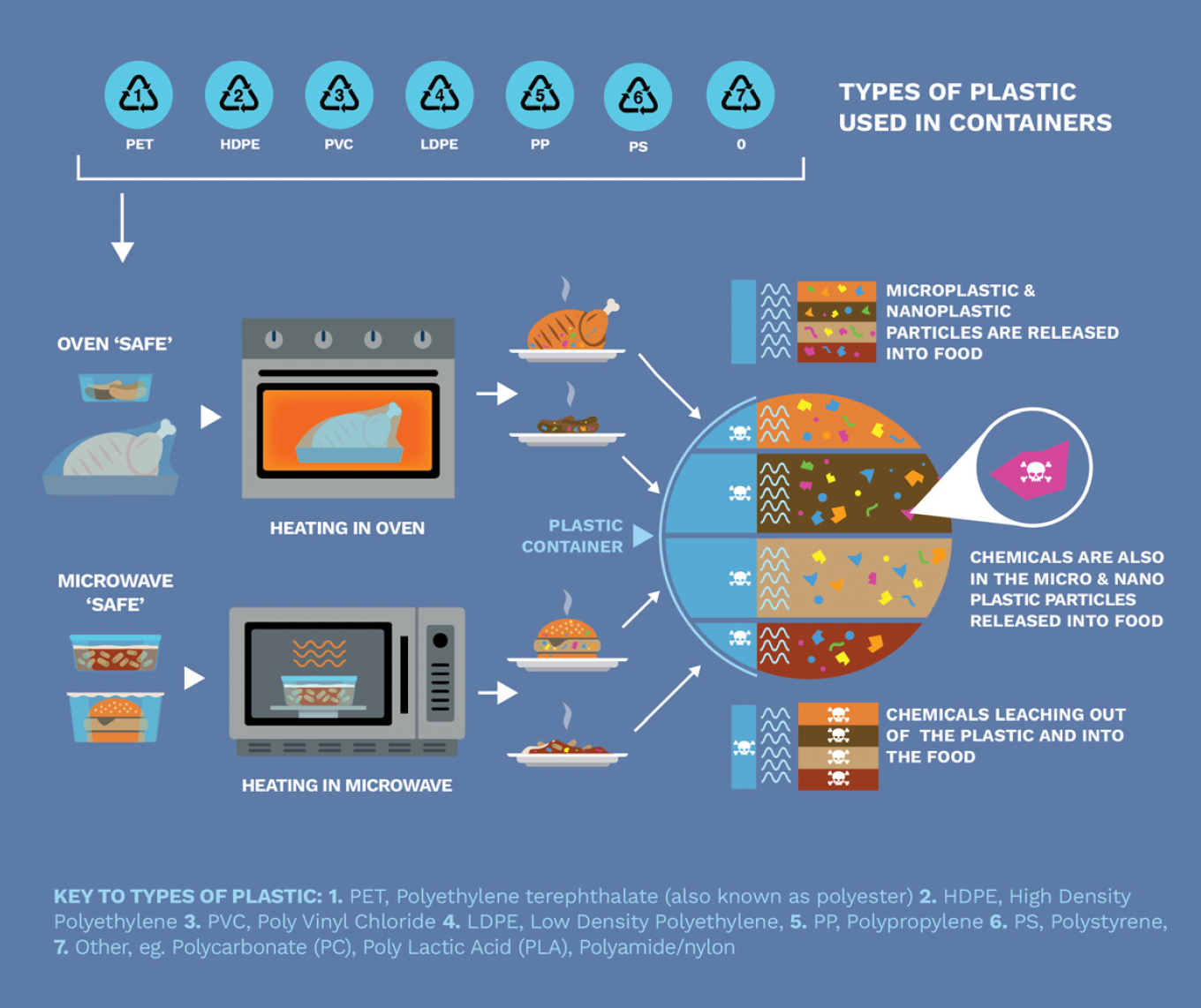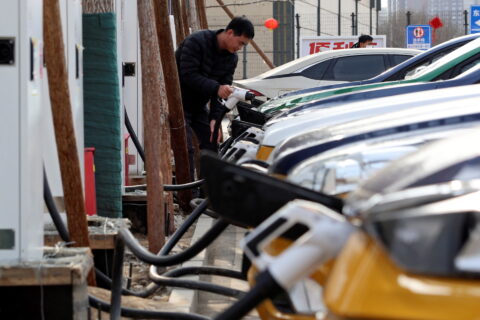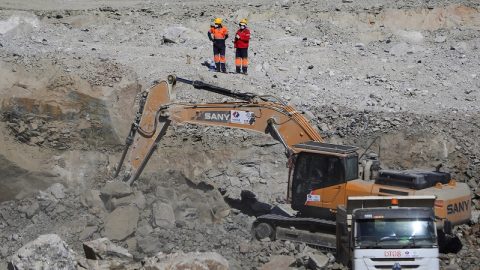A group of emerging economies chaired by China has proposed that what they regard as protectionism by developed countries should be discussed formally at the COP29 climate summit, setting up an “agenda fight” that could disrupt the talks.
The BASIC group of nations – Brazil, South Africa, India and China – has put forward an agenda item for COP29 in Baku, seen by Climate Home, that addresses “concerns with climate-change related unilateral restrictive trade measures”.
The submission to the UN says these trade measures “under the guise of climate objectives represent a systemic concern with disproportionate effects on developing [countries]”.
“Such measures increase the cost of worldwide climate action, hinder the efforts of developing countries to advance their climate commitments and ambition, undermine the basis of multilateral cooperation and contradict” UN climate agreements, the text adds.
Sign up to get our weekly newsletter straight to your inbox, plus breaking news, investigations and extra bulletins from key events
Aaron Cosbey, a trade expert with the International Institute for Sustainable Development (IISD), told a recent webinar that BASIC’s proposal was “explosive”, adding “the potential for these issues to derail progress at that COP is very real.”
EU carbon border levy
The BASIC proposal is likely to be fiercely resisted by the European Union (EU) and the United States. Although the submission does not mention specific policies, BASIC has criticised the EU’s plan for a carbon border adjustment mechanism (CBAM) – essentially a carbon tax on imports – as well as certain provisions contained in the US Inflation Reduction Act (IRA).
The COP29 president, Azerbaijan’s Mukhtar Babayev, and the head of the UN climate body, Simon Stiell, are tasked with drawing up a draft agenda for the UN summit from a list of submissions, after consulting with governments. At the start of COP29, all governments will review the suggested items and agree what makes it on to the final agenda. Arguments could delay the start of talks.
Legal experts say Trump could quit Paris pact – but leaving UNFCCC much harder
Cosbey said the EU and others are “never going to agree” to the agenda item on trade, because its language is “prejudicial” and the issues it raises are already included under a track of the UN climate talks known as “response measures”.
“They will argue: ‘we don’t want to discuss this as a general agenda item – we want to put it in this box over here where we’ve been discussing it all these years’,” Cosbey added, noting it “may sound like a minor thing” but previous negotiations have been hung up for days over such “agenda fights”.
The BASIC countries have long opposed the CBAM – and they made a similar agenda proposal ahead of COP28. But, led by the group’s then chair Brazil, they backed down and accepted it being left off the agenda.
Cosbey said the question of whether it delays the adoption of the COP agenda this time around depends on whether BASIC countries are “serious” about wanting a formal discussion or are “putting it forward strategically” to draw attention to the issue and extract some concessions in return for dropping it.
The EU’s CBAM is a levy on certain carbon-intensive and heavily traded products imported into the bloc from countries that do not have a price on carbon. It was approved by the EU in 2021 and will come into force in 2026.
Its supporters argue it is necessary to avoid carbon leakage, whereby producers of energy-intensive products like steel, cement and aluminum move their operations out of the EU to countries with weaker environmental regulations.
But in a communique issued after their leaders met in Russia in late October, BASIC described the CBAM as a “unilateral, punitive and discriminatory protectionist” measure.
Aruna Sharma, a former secretary at the Indian steel ministry, told the same webinar the EU wants other countries to follow the pace of its emissions-cutting goals without consulting them properly. Measuring emissions of products in order to comply with the CBAM will be expensive, she added.
India’s then Steel Secretary Aruna Sharma speaks during an interview with Reuters in New Delhi, India, July 30, 2018. REUTERS/Adnan Abidi
Costs of compliance
Chantal Line Carpentier, head of the New York office of the United Nations Conference on Trade and Development (UNCTAD), said many developing countries spend more on servicing their debt than on social welfare. “So how are these people supposed to be able to invest…in their [carbon] monitoring and verification systems when they can’t even finance their education or their health?” she asked.
IISD’s Cosbey added that even green exporters will have to pay to measure their emissions under CBAM, which adds up to “significant costs especially if you are a small producer”.
Both Cosbey and Sharma said these costs would grow if other nations brought in similar measures using different emissions measurement and reporting requirements. Cosbey said a proliferation of such systems would be “trade restrictive and undermine the ability of trade as an engine of development … to lift countries out of poverty”.
Canada, Australia and the UK are among the countries considering their own carbon trade levies.
How Azerbaijan locked up climate and social justice advocate ahead of COP29
Sharma added that the EU’s CBAM does not take into account a concept that is core to UN climate agreements of common but differentiated responsibilities (CBDR), under which developed countries are supposed to do more to tackle climate change than developing nations.
The EU has previously said the CBAM should be addressed at the World Trade Organisation (WTO) rather than in the UN climate talks. But UNCTAD’s Carpentier said WTO talks do not recognise the CBDR principle – and that taking up the CBAM there would “lead to a forever discussion”.
An UNCTAD study suggested the EU could use some of the revenues from its CBAM levy to help developing countries clean up production of goods that are taxable under the scheme. Sharma noted that, while the EU makes a lot of its steel with electric arc furnaces, many of its trade partners still use more polluting blast furnaces fired with coking coal.
The US’s Inflation Reduction Act, introduced by the Biden administration, has also drawn criticism from other governments for including subsidies for electric vehicles that require a large share of their parts to be produced in North America.
This condition has angered other car-making countries which see it as an unfair attempt to get automakers to relocate to the US. The EU, the UK, Japan and South Korea have all complained to the US government over the provision.
(Reporting by Joe Lo, editing by Megan Rowling)
The post Emerging economies set up COP29 agenda fight over trade measures appeared first on Climate Home News.
Emerging economies set up COP29 agenda fight over trade measures
Climate Change
Cropped 25 February 2026: Food inflation strikes | El Niño looms | Biodiversity talks stagnate
We handpick and explain the most important stories at the intersection of climate, land, food and nature over the past fortnight.
This is an online version of Carbon Brief’s fortnightly Cropped email newsletter.
Subscribe for free here.
Key developments
Food inflation on the rise
DELUGE STRIKES FOOD: Extreme rainfall and flooding across the Mediterranean and north Africa has “battered the winter growing regions that feed Europe…threatening food price rises”, reported the Financial Times. Western France has “endured more than 36 days of continuous rain”, while farmers’ associations in Spain’s Andalusia estimate that “20% of all production has been lost”, it added. Policy expert David Barmes told the paper that the “latest storms were part of a wider pattern of climate shocks feeding into food price inflation”.
-
Sign up to Carbon Brief’s free “Cropped” email newsletter. A fortnightly digest of food, land and nature news and views. Sent to your inbox every other Wednesday.
NO BEEF: The UK’s beef farmers, meanwhile, “face a double blow” from climate change as “relentless rain forces them to keep cows indoors”, while last summer’s drought hit hay supplies, said another Financial Times article. At the same time, indoor growers in south England described a 60% increase in electricity standing charges as a “ticking timebomb” that could “force them to raise their prices or stop production, which will further fuel food price inflation”, wrote the Guardian.
‘TINDERBOX’ AND TARIFFS: A study, covered by the Guardian, warned that major extreme weather and other “shocks” could “spark social unrest and even food riots in the UK”. Experts cited “chronic” vulnerabilities, including climate change, low incomes, poor farming policy and “fragile” supply chains that have made the UK’s food system a “tinderbox”. A New York Times explainer noted that while trade could once guard against food supply shocks, barriers such as tariffs and export controls – which are being “increasingly” used by politicians – “can shut off that safety valve”.
El Niño looms
NEW ENSO INDEX: Researchers have developed a new index for calculating El Niño, the large-scale climate pattern that influences global weather and causes “billions in damages by bringing floods to some regions and drought to others”, reported CNN. It added that climate change is making it more difficult for scientists to observe El Niño patterns by warming up the entire ocean. The outlet said that with the new metric, “scientists can now see it earlier and our long-range weather forecasts will be improved for it.”
WARMING WARNING: Meanwhile, the US Climate Prediction Center announced that there is a 60% chance of the current La Niña conditions shifting towards a neutral state over the next few months, with an El Niño likely to follow in late spring, according to Reuters. The Vibes, a Malaysian news outlet, quoted a climate scientist saying: “If the El Niño does materialise, it could possibly push 2026 or 2027 as the warmest year on record, replacing 2024.”
CROP IMPACTS: Reuters noted that neutral conditions lead to “more stable weather and potentially better crop yields”. However, the newswire added, an El Niño state would mean “worsening drought conditions and issues for the next growing season” to Australia. El Niño also “typically brings a poor south-west monsoon to India, including droughts”, reported the Hindu’s Business Line. A 2024 guest post for Carbon Brief explained that El Niño is linked to crop failure in south-eastern Africa and south-east Asia.
News and views
- DAM-AG-ES: Several South Korean farmers filed a lawsuit against the country’s state-owned utility company, “seek[ing] financial compensation for climate-related agricultural damages”, reported United Press International. Meanwhile, a national climate change assessment for the Philippines found that the country “lost up to $219bn in agricultural damages from typhoons, floods and droughts” over 2000-10, according to Eco-Business.
- SCORCHED GRASS: South Africa’s Western Cape province is experiencing “one of the worst droughts in living memory”, which is “scorching grass and killing livestock”, said Reuters. The newswire wrote: “In 2015, a drought almost dried up the taps in the city; farmers say this one has been even more brutal than a decade ago.”
- NOUVELLE VEG: New guidelines published under France’s national food, nutrition and climate strategy “urged” citizens to “limit” their meat consumption, reported Euronews. The delayed strategy comes a month after the US government “upended decades of recommendations by touting consumption of red meat and full-fat dairy”, it noted.
- COURTING DISASTER: India’s top green court accepted the findings of a committee that “found no flaws” in greenlighting the Great Nicobar project that “will lead to the felling of a million trees” and translocating corals, reported Mongabay. The court found “no good ground to interfere”, despite “threats to a globally unique biodiversity hotspot” and Indigenous tribes at risk of displacement by the project, wrote Frontline.
- FISH FALLING: A new study found that fish biomass is “falling by 7.2% from as little as 0.1C of warming per decade”, noted the Guardian. While experts also pointed to the role of overfishing in marine life loss, marine ecologist and study lead author Dr Shahar Chaikin told the outlet: “Our research proves exactly what that biological cost [of warming] looks like underwater.”
- TOO HOT FOR COFFEE: According to new analysis by Climate Central, countries where coffee beans are grown “are becoming too hot to cultivate them”, reported the Guardian. The world’s top five coffee-growing countries faced “57 additional days of coffee-harming heat” annually because of climate change, it added.
Spotlight
Nature talks inch forward
This week, Carbon Brief covers the latest round of negotiations under the UN Convention on Biological Diversity (CBD), which occurred in Rome over 16-19 February.
The penultimate set of biodiversity negotiations before October’s Conference of the Parties ended in Rome last week, leaving plenty of unfinished business.
The CBD’s subsidiary body on implementation (SBI) met in the Italian capital for four days to discuss a range of issues, including biodiversity finance and reviewing progress towards the nature targets agreed under the Kunming-Montreal Global Biodiversity Framework (GBF).
However, many of the major sticking points – particularly around finance – will have to wait until later this summer, leaving some observers worried about the capacity for delegates to get through a packed agenda at COP17.
The SBI, along with the subsidiary body on scientific, technical and technological advice (SBSTTA) will both meet in Nairobi, Kenya, later this summer for a final round of talks before COP17 kicks off in Yerevan, Armenia, on 19 October.
Money talks
Finance for nature has long been a sticking point at negotiations under the CBD.
Discussions on a new fund for biodiversity derailed biodiversity talks in Cali, Colombia, in autumn 2024, requiring resumed talks a few months later.
Despite this, finance was barely on the agenda at the SBI meetings in Rome. Delegates discussed three studies on the relationship between debt sustainability and implementation of nature plans, but the more substantive talks are set to take place at the next SBI meeting in Nairobi.
Several parties “highlighted concerns with the imbalance of work” on finance between these SBI talks and the next ones, reported Earth Negotiations Bulletin (ENB).
Lim Li Ching, senior researcher at Third World Network, noted that tensions around finance permeated every aspect of the talks. She told Carbon Brief:
“If you’re talking about the gender plan of action – if there’s little or no financial resources provided to actually put it into practice and implement it, then it’s [just] paper, right? Same with the reporting requirements and obligations.”
Monitoring and reporting
Closely linked to the issue of finance is the obligations of parties to report on their progress towards the goals and targets of the GBF.
Parties do so through the submission of national reports.
Several parties at the talks pointed to a lack of timely funding for driving delays in their reporting, according to ENB.
A note released by the CBD Secretariat in December said that no parties had submitted their national reports yet; by the time of the SBI meetings, only the EU had. It further noted that just 58 parties had submitted their national biodiversity plans, which were initially meant to be published by COP16, in October 2024.
Linda Krueger, director of biodiversity and infrastructure policy at the environmental not-for-profit Nature Conservancy, told Carbon Brief that despite the sparse submissions, parties are “very focused on the national report preparation”. She added:
“Everybody wants to be able to show that we’re on the path and that there still is a pathway to getting to 2030 that’s positive and largely in the right direction.”
Watch, read, listen
NET LOSS: Nigeria’s marine life is being “threatened” by “ghost gear” – nets and other fishing equipment discarded in the ocean – said Dialogue Earth.
COMEBACK CAUSALITY: A Vox long-read looked at whether Costa Rica’s “payments for ecosystem services” programme helped the country turn a corner on deforestation.
HOMEGROWN GOALS: A Straits Times podcast discussed whether import-dependent Singapore can afford to shelve its goal to produce 30% of its food locally by 2030.
‘RUSTING’ RIVERS: The Financial Times took a closer look at a “strange new force blighting the [Arctic] landscape”: rivers turning rust-orange due to global warming.
New science
- Lakes in the Congo Basin’s peatlands are releasing carbon that is thousands of years old | Nature Geoscience
- Natural non-forest ecosystems – such as grasslands and marshlands – were converted for agriculture at four times the rate of land with tree cover between 2005 and 2020 | Proceedings of the National Academy of Sciences
- Around one-quarter of global tree-cover loss over 2001-22 was driven by cropland expansion, pastures and forest plantations for commodity production | Nature Food
In the diary
- 2-6 March: UN Food and Agriculture Organization regional conference for Latin America and Caribbean | Brasília
- 5 March: Nepal general elections
- 9-20 March: First part of the thirty-first session of the International Seabed Authority (ISA) | Kingston, Jamaica
Cropped is researched and written by Dr Giuliana Viglione, Aruna Chandrasekhar, Daisy Dunne, Orla Dwyer and Yanine Quiroz.
Please send tips and feedback to cropped@carbonbrief.org
The post Cropped 25 February 2026: Food inflation strikes | El Niño looms | Biodiversity talks stagnate appeared first on Carbon Brief.
Cropped 25 February 2026: Food inflation strikes | El Niño looms | Biodiversity talks stagnate
Climate Change
Battery passport plan aims to clean up the industry powering clean energy
For millions of consumers, the sustainability scheme stickers found on everything from bananas to chocolate bars and wooden furniture are a way to choose products that are greener and more ethical than some of the alternatives.
Inga Petersen, executive director of the Global Battery Alliance (GBA), is on a mission to create a similar scheme for one of the building blocks of the transition from fossil fuels to clean energy systems: batteries.
“Right now, it’s a race to the bottom for whoever makes the cheapest battery,” Petersen told Climate Home News in an interview.
The GBA is working with industry, international organisations, NGOs and governments to establish a sustainable and transparent battery value chain by 2030.
“One of the things we’re trying to do is to create a marketplace where products can compete on elements other than price,” Petersen said.
Under the GBA’s plan, digital product passports and traceability would be used to issue product-level sustainability certifications, similar to those commonplace in other sectors such as forestry, Petersen said.
Managing battery boom’s risks
Over the past decade, battery deployment has increased 20-fold, driven by record-breaking electric vehicle (EV) sales and a booming market for batteries to store intermittent renewable energy.
Falling prices have been instrumental to the rapid expansion of the battery market. But the breakneck pace of growth has exposed the potential environmental and social harms associated with unregulated battery production.
From South America to Zimbabwe and Indonesia, mineral extraction and refining has led to social conflict, environmental damage, human rights violations and deforestation. In Indonesia, the nickel industry is powered by coal while in Europe, production plants have been met with strong local opposition over pollution concerns.
“We cannot manage these risks if we don’t have transparency,” Petersen said.
The GBA was established in 2017 in response to concerns about the battery industry’s impact as demand was forecast to boom and reports of child labour in the cobalt mines of the Democratic Republic of the Congo made headlines.
The alliance’s initial 19 members recognised that the industry needed to scale rapidly but with “social, environmental and governance guardrails”, said Petersen, who previously worked with the UN Environment Programme to develop guiding principles to minimise the environmental impact of mining.

Digital battery passport
Today, the alliance is working to develop a global certification scheme that will recognise batteries that meet minimum thresholds across a set of environmental, social and governance benchmarks it has defined along the entire value chain.
Participating mines, manufacturing plants and recycling facilities will have to provide data for their greenhouse gas emissions as well as how they perform against benchmarks for assessing biodiversity loss, pollution, child and forced labour, community impacts and respect for the rights of Indigenous peoples, for example.
The data will be independently verified, scored, aggregated and recorded on a battery passport – a digital record of the battery’s composition, which will include the origin of its raw materials and its performance against the GBA’s sustainability benchmarks.
The scheme is due to launch in 2027.
A carrot and a stick
Since the start of the year, some of the world’s largest battery companies have been voluntarily participating in the biggest pilot of the scheme to date.
More than 30 companies across the EV battery and stationary storage supply chains are involved, among them Chinese battery giants CATL and BYD subsidiary FinDreams Battery, miner Rio Tinto, battery producers Samsung SDI and Siemens, automotive supplier Denso and Tesla.
Petersen said she was “thrilled” about support for the scheme. Amid a growing pushback against sustainability rules and standards, “these companies are stepping up to send a public signal that they are still committed to a sustainable and responsible battery value chain,” she said.

There are other motivations for battery producers to know where components in their batteries have come from and whether they have been produced responsibly.
In 2023, the EU adopted a law regulating the batteries sold on its market.
From 2027, it mandates all batteries to meet environmental and safety criteria and to have a digital passport accessed via a QR code that contains information about the battery’s composition, its carbon footprint and its recycling content.
The GBA certification is not intended as a compliance instrument for the EU law but it will “add a carrot” by recognising manufacturers that go beyond meeting the bloc’s rules on nature and human rights, Petersen said.
Raising standards in complex supply chain
But challenges remain, in part due to the complexity of battery supply chains.
In the case of timber, “you have a single input material but then you have a very complex range of end products. For batteries, it’s almost the reverse,” Petersen said.
The GBA wants its certification scheme to cover all critical minerals present in batteries, covering dozens of different mining, processing and manufacturing processes and hundreds of facilities.
“One of the biggest impacts will be rewarding the leading performers through preferential access to capital, for example, with investors choosing companies that are managing their risk responsibly and transparently,” Petersen said.
It could help influence public procurement and how companies, such as EV makers, choose their suppliers, she added. End consumers will also be able to access a summary of the GBA’s scores when deciding which product to buy.
US, Europe rush to build battery supply chain
Today, the GBA has more than 150 members across the battery value chain, including more than 50 companies, of which over a dozen are Chinese firms.
China produces over three-quarters of batteries sold globally and it dominates the world’s battery recycling capacity, leaving the US and Europe scrambling to reduce their dependence on Beijing by building their own battery supply chains.
Petersen hopes the alliance’s work can help build trust in the sector amid heightened geopolitical tensions. “People want to know where the materials are coming from and which actors are involved,” she said.
At the same time, companies increasingly recognise that failing to manage sustainability risks can threaten their operations. Protests over environmental concerns have shut down mines and battery factories across the world.
“Most companies know that and that’s why they’re making these efforts,” Petersen added.
The post Battery passport plan aims to clean up the industry powering clean energy appeared first on Climate Home News.
Battery passport plan aims to clean up the industry powering clean energy
Climate Change
Reheating plastic food containers: what science says about microplastics and chemicals in ready meals
How often do you eat takeaway food? What about pre-prepared ready meals? Or maybe just microwaving some leftovers you had in the fridge? In any of these cases, there’s a pretty good chance the container was made out of plastic. Considering that they can be an extremely affordable option, are there any potential downsides we need to be aware of? We decided to investigate.
Scientific research increasingly shows that heating food in plastic packaging can release microplastics and plastic chemicals into the food we eat. A new Greenpeace International review of peer-reviewed studies finds that microwaving plastic food containers significantly increases this release, raising concerns about long-term human health impacts. This article summarises what the science says, what remains uncertain, and what needs to change.
There’s no shortage of research showing how microplastics and nanoplastics have made their way throughout the environment, from snowy mountaintops and Arctic ice, into the beetles, slugs, snails and earthworms at the bottom of the food chain. It’s a similar story with humans, with microplastics found in blood, placenta, lungs, liver and plenty of other places. On top of this, there’s some 16,000 chemicals known to be either present or used in plastic, with a bit over a quarter of those chemicals already identified as being of concern. And there are already just under 1,400 chemicals that have been found in people.
Not just food packaging, but plenty of household items either contain or are made from plastic, meaning they potentially could be a source of exposure as well. So if microplastics and chemicals are everywhere (including inside us), how are they getting there? Should we be concerned that a lot of our food is packaged in plastic?
Greenpeace analysis of 24 articles in peer-reviewed scientific journals found that the plastics we use to package our food are directly risking our health.
Heating food in plastic packaging dramatically increases the levels of microplastics and chemicals that leach into our food.
Plastic food packaging: the good, the bad, and the ugly
The growing trend towards ready meals, online shopping and restaurant delivery, and away from home-prepared meals and individual grocery shopping, is happening in every region of the world. Since the first microwaveable TV dinners were introduced in the US in the 1950s to sell off excess stock of turkey meat after Thanksgiving holidays, pre-packaged ready meals have grown hugely in sales. The global market is worth $190bn in 2025, and is expected to reach a total volume of 71.5 million tonnes by 2030. It’s also predicted that the top five global markets for convenience food (China, USA, Japan, Mexico and Russia) will remain relatively unchanged up to 2030, with the most revenue in 2019 generated by the North America region.
A new report from Greenpeace International set out to analyse articles in peer-reviewed, scientific journals to look at what exactly the research has to say about plastic food packaging and food contact plastics.
Here’s what we found.
Our review of 24 recent articles highlights a consistent picture that regulators, businesses and
consumers should be concerned about: when food is packaged in plastic and then microwaved, this significantly increases the risk of both microplastic and chemical release, and that these microplastics and chemicals will leach into the food inside the packaging.
And not just some, but a lot of microplastics and chemicals.
When polystyrene and polypropylene containers filled with water were microwaved after being stored in the fridge or freezer, one study found they released anywhere between 100,000-260,000 microplastic particles, and another found that five minutes of microwave heating could release between 326,000-534,000 particles into food.
Similarly there are a wide range of chemicals that can be and are released when plastic is heated. Across different plastic types, there are estimated to be around 16,000 different chemicals that can either be used or present in plastics, and of these around 4,200 are identified as being hazardous, whilst many others lack any form of identification (hazardous or otherwise) at all.
The research also showed that 1,396 food contact plastic chemicals have been found in humans, several of which are known to be hazardous to human health. At the same time, there are many chemicals for which no research into the long-term effects on human health exists.
Ultimately, we are left with evidence pointing towards increased release of microplastics and plastic chemicals into food from heating, the regular migration of microplastics and chemicals into food, and concerns around what long-term impacts these substances have on human health, which range from uncertain to identified harm.

The known unknowns of plastic chemicals and microplastics
The problem here (aside from the fact that plastic chemicals are routinely migrating into our food), is that often we don’t have any clear research or information on what long-term impacts these chemicals have on human health. This is true of both the chemicals deliberately used in plastic production (some of which are absolutely toxic, like antimony which is used to make PET plastic), as well as in what’s called non-intentionally added substances (NIAS).
NIAS refers to chemicals which have been found in plastic, and typically originate as impurities, reaction by-products, or can even form later when meals are heated. One study found that a UV stabiliser plastic additive reacted with potato starch when microwaved to create a previously unknown chemical compound.
We’ve been here before: lessons from tobacco, asbestos and lead
Although none of this sounds particularly great, this is not without precedence. Between what we do and don’t know, waiting for perfect evidence is costly both economically and in terms of human health. With tobacco, asbestos, and lead, a similar story to what we’re seeing now has played out before. After initial evidence suggesting problems and toxicity, lobbyists from these industries pushed back to sow doubt about the scientific validity of the findings, delaying meaningful action. And all the while, between 1950-2000, tobacco alone led to the deaths of around 60 million people. Whilst distinguishing between correlation and causation, and finding proper evidence is certainly important, it’s also important to take preventative action early, rather than wait for more people to be hurt in order to definitively prove the point.
Where to from here?
This is where adopting the precautionary principle comes in. This means shifting the burden of proof away from consumers and everyone else to prove that a product is definitely harmful (e.g. it’s definitely this particular plastic that caused this particular problem), and onto the manufacturer to prove that their product is definitely safe. This is not a new idea, and plenty of examples of this exist already, such as the EU’s REACH regulation, which is centred around the idea of “no data, no market” – manufacturers are obligated to provide data demonstrating the safety of their product in order to be sold.

Greenpeace analysis of 24 articles in peer-reviewed scientific journals found that the plastics we use to package our food are directly risking our health.
Heating food in plastic packaging dramatically increases the levels of microplastics and chemicals that leach into our food.
But as it stands currently, the precautionary principle isn’t applied to plastics. For REACH in particular, plastics are assessed on a risk-based approach, which means that, as the plastic industry itself has pointed out, something can be identified as being extremely hazardous, but is still allowed to be used in production if the leached chemical stays below “safe” levels, despite that for some chemicals a “safe” low dose is either undefined, unknown, or doesn’t exist.
A better path forward
Governments aren’t acting fast enough to reduce our exposure and protect our health. There’s no shortage of things we can do to improve this situation. The most critical one is to make and consume less plastic. This is a global problem that requires a strong Global Plastics Treaty that reduces global plastic production by at least 75% by 2040 and eliminates harmful plastics and chemicals. And it’s time that corporations take this growing threat to their customers’ health seriously, starting with their food packaging and food contact products. Here are a number of specific actions policymakers and companies can take, and helpful hints for consumers.
Policymakers & companies
- Implement the precautionary principle:
- For policymakers – Stop the use of hazardous plastics and chemicals, on the basis of their intrinsic risk, rather than an assessment of “safe” levels of exposure.
- For companies – Commit to ensure that there is a “zero release” of microplastics and hazardous chemicals from packaging into food, alongside an Action Plan with milestones to achieve this by 2035
- Stop giving false assurances to consumers about “microwave safe” containers
- Stop the use of single-use and plastic packaging, and implement policies and incentives to foster the uptake of reuse systems and non-toxic packaging alternatives.
Consumers
- Encourage your local supermarkets and shops to shift away from plastic where possible
- Avoid using plastic containers when heating/reheating food
- Use non-plastic refill containers
Trying to dodge plastic can be exhausting. If you’re feeling overwhelmed, you’re not alone. We can only do so much in this broken plastic-obsessed system. Plastic producers and polluters need to be held accountable, and governments need to act faster to protect the health of people and the planet. We urgently need global governments to accelerate a justice-centred transition to a healthier, reuse-based, zero-waste future. Ensure your government doesn’t waste this once-in-a-generation opportunity to end the age of plastic.
-
Greenhouse Gases7 months ago
Guest post: Why China is still building new coal – and when it might stop
-
Climate Change7 months ago
Guest post: Why China is still building new coal – and when it might stop
-

 Greenhouse Gases2 years ago
Greenhouse Gases2 years ago嘉宾来稿:满足中国增长的用电需求 光伏加储能“比新建煤电更实惠”
-
Climate Change2 years ago
Bill Discounting Climate Change in Florida’s Energy Policy Awaits DeSantis’ Approval
-
Climate Change2 years ago
Spanish-language misinformation on renewable energy spreads online, report shows
-

 Climate Change2 years ago
Climate Change2 years ago嘉宾来稿:满足中国增长的用电需求 光伏加储能“比新建煤电更实惠”
-
Climate Change Videos2 years ago
The toxic gas flares fuelling Nigeria’s climate change – BBC News
-

 Carbon Footprint2 years ago
Carbon Footprint2 years agoUS SEC’s Climate Disclosure Rules Spur Renewed Interest in Carbon Credits








